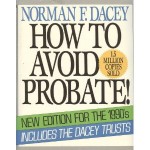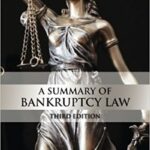
I read it on the Internet: it must be so.
Or not. I found another Victoria Ring blooper this week, thanks to a friend on her email list. Ms. Ring, a paralegal who trains other paralegals (and lawyers, I fear) delightedly tells her LinkedIn group that debtors in California can not only cram down the mortgages on their homes, but they can reduce the monthly payments consistent with the altered mortgage.
Funny, I hadn’t heard news so momentous. According to Ms. Ring:
The client had a home that carried a mortgage of $402,500; however, the home was appraised at only $178,000. This is a common occurrence in California….For the case I worked on this past week, when the debtors income and expense information was entered into Schedule I and J of the bankruptcy petition, the Chapter 13 Plan calculator in the software told us the debtor did not have enough disposable income to pay the current mortgage payment of $2,500. However, by reducing the mortgage payment to only $1,500; the debtor would be able to afford to stay in his home. (The mortgage payment was reduced because the home was crammed down from $402,000 to $178,000).
How do we account for the provisions of 1322(b)(2) on this scenario?
(b) Subject to subsections (a) and (c) of this section, the plan may—
(2) modify the rights of holders of secured claims, other than a claim secured only by a security interest in real property that is the debtor’s principal residence,
This trainer of professionals doesn’t explain why the Bankruptcy Code doesn’t apply in California, or point us to a decision breaking ranks with the otherwise consistent line of cases that follow the provisions of the statute. I wish what she reports was the law, but it isn’t.
Now, I can see a couple of ways something like what she recounts could be so. Perhaps the “home” the debtor has isn’t his principal residence. Perhaps, it is a junior mortgage that has been stripped off. (Or perhaps Enewally was overruled while I slept).
But in Ms. Ring’s gleeful announcement that the legal world has shifted, we’re dealing either with imprecision, at best, or woeful ignorance at worst. If you hold yourself out as one who instructs others, you owe it to your students to be both correct and precise. How, otherwise, do they learn how bankruptcy law works?
I try to console myself, through clenched teeth, that free speech is priceless, and the free flow of information on the internet is, largely, a treasure. But some of what flows on the internet is sludge. Watch where you step.








You gotta love the poorly informed. They keep the rest of us busy fixing their messes. However, Ms. Ring seems a bit more than uninformed. You have to wonder if she sits at home thinking about how she can con people into using her services.
Unfortunately, even entire law firms can get it wrong. I recently read a blog post from a local competitor advising potential clients to get their credit counseling class done before visiting their BK attorney because they must have their certificate for AT LEAST 180 days before filing. When I first read that, I thought it was a typo… then I read further. How does this firm ever file a case that isn’t dismissed as a matter of procedure?
My thought always in situations like this, is that it is an opportunity to distinguish yourself from the competition in a way that conveys the most basic of values that we want clients to find in us: competence.
Kyle — Did you install a camera at my home and are watching my every move? I can tell you are a nut like Cathy Moran. You need to look at all sides of an issue before opening your mouth instead of spending your time being cruel and hateful. Legal people should be working to the good of helping others – not sitting around trying to degrade others. You should be ashamed of yourself. Take a legal ethics class before you open your big mouth again.
Let’s exercise a bit of courtesy. We can have different views and differences of opinion without name calling. The subject we are addressing is too important for us to be lured off course by personal attacks.
I wanted to comment on that article but as a non-attorney I decided to remain quiet. I appreciate you pointing this out as it’s things like this that makes it very difficult for many attorneys that I work for who are just starting out in bankruptcy.
It seems to me that training new professionals needs to stress starting with the statutues; analyzing the facts, thinking clearly and mastering the “lingo” of bankruptcy to express yourself. All of that is missing in her blurb on this miraculous change in bankruptcy practice.
To quote Charlie Brown: ” Arghhhhhhhhhhh”
I wrote a reply to her post on Linkedin questioning how someone can claim so much bk law as to teach bk to lawyers and paralegals does not know a debtor cannot cram down a mortgage on a personal residence. (No, it is clear from the article linked to her Linkedin post that she is not referring to stripping junior mortgages or the rare situation of a mortgage on the residence and other property). I am glad Cathy wrote this article because I was beginning to think I was the only one that found the article amazing given Ms. Ring’s claim of experience and knowledge about bankruptcy law. I pity those she trains if this is what they learn… My assistant for less than 2 years knows when you can cram down or stip off liens in C13 cases.
When I attended law school, one of the first things my professor taught in CivPro (civil procedure) class was to always double-check the law prior to analyzing the case at hand. It may have changed in the interim since law school, as it does almost every other day.
Perhaps her discussion emanated from trustee comments (given the economy and banks involvement there). But it is the governing attorney whose signature is on the bottom line, and is therefore held accountable. maybe the banks aren’t fighting it because of the size of their portfolios…
I’m not familiar with the current state of bankruptcy law in California, but I do know in other states one can strip down the mortgage loan on a principal residence if the mortgage loan is secured by something in addition to the mortgage itself. For example, in the past a bank would often take an additional security interest in accounts held by the mortgagor at the bank when originating a mortgage loan. Such a practice would remove the constraints of 1322(b)(2), since the bank’s claim would not be secured “only” by the principal residence.
You’re right and if that is what happened in the case Ms. Ring reports, she should point out that a particular set of facts (additional collateral) takes the case outside of the 1322 prohibition.
You still have the Enewally problem of paying off the secured loan in full during the plan, which for many loans is a show stopper.
There have been a lot of conflicting stories regarding the treatment of mortgage cram downs and strip downs in the various bankruptcy courts.
Some attorneys have proposed cram downs on first mortgages and those Chapter 13 Plans have been confirmed. Other attorneys have only been successful in proposing second mortgage cram downs but unable to do first mortgages.
Still, some attorneys are only able to propose cram downs for rental property while others only propose cram downs on primary residences.
In order to substantiate their success, attorneys I have spoken to refer to either Section 502 of the bankruptcy code or 11 USC 1322(b).
And because of all these variances, much confusion has developed.
I understand that the ability to cram down the first mortgage to the market value on the primary residence has passed the House of Representatives, it failed in the Senate. However, I have spoken to attorneys who were able to get first mortgage cram downs approved in hardship situations. (Note: The key word here is: hardship.)
Therefore, to help me with my research, I would sincerely appreciate you taking a moment and let me know how mortgage cram downs are handled in your jurisdiction. I will accumulate the information and write a future article that contains a summary of my research. Hopefully, together, we can determine the cause of this confusion and work in the best interest of protecting the debtor.
You can submit your response either by replying to this post or email your response privately to me at [email protected]
Victoria Ring
Chapter713Training.Com
http://www.chapter713training.com
and
http://www.mybankruptcyschool.com
For starters, I’d be interested in the docket number of the cases you reference where bankruptcy courts permitted the strip down of first mortgages on homes based on hardship. I would like to see what basis the attorney offered, and the judge bought, for a result so at odds with 1322(b).
Cathy —
I work on 30-35 petitions every week. You cannot expect me to remember every single petition and their case numbers, especially since only 2 or 3 first mortgage cram downs have been proposed in the past 5 or 6 years. But I can give you one recent case number where the attorney proposed the cram down from $385,000 to $187,000. The attorney also stripped the second mortgage of $32,000.
Central District of California
Case No: 11-30026
Debtor Name: Houchens
However, you have a mean spirit by accusing me of wrong doing without weighing all the facts. Why would I intentionally try to hurt other people by publishing wrong information? After 25 years in business, people know this is not within my character. In addition, I do not need to spend hours researching cases to prove anything to you. However, the next time an attorney asks me to do a cram down on a first mortgage, you can be certain that I will call you on the phone and send you the petition so you can verify that I do not lie since it appears you are going after blood instead of trying to be understanding and get to the bottom of the issue.
Below is the response I sent to Jay Fleishman regarding this topic. But Cathy, as a legal person you should look at all sides before jumping to conclusions and publishing unprofessional articles to hurt others. I pray to Jesus Christ that you deal with this mean spirit and get it out of your soul.
Here is the email I sent to Jay:
Jay —
You are absolutely right that attorneys should not rely on their VBAs, but with all the new attorneys entering the field, they rely on their VBA instead of other attorneys. Then, when you have an inexperienced VBA and an inexperienced attorney, it always creates problems. I work with my attorneys in a paralegal capacity only. I ask them to make the legal decisions and I carry out whatever they decide. I encourage them to call attorneys in their area and get answers; but many of them do not.
This is why I have had several attorneys propose cram downs on first mortgages and actually get their plans approved but it has only been 2 or 3 in the past 6 years. I do not know what argument they used and I cannot remember the names of the debtors, but I have seen it done. As a paralegal, I was not aware that this was not possible since I was only following the direction of the attorneys I work for. And since I write articles on many of the petitions I work on, it was impossible for me to know that cramming down first mortgages was not legal since my job is not to interpret the law.
I am taking a survey to determine how cram downs are treated in other jurisdictions; however, if one of my attorneys wants to propose a cram down on a first mortgage, I have no option except to follow the attorney’s direction since I work in a paralegal capacity. The only difference is that I will not write an article about it this time. Instead of understanding my articles to be NEWS, people are assuming I am playing the attorney role. I am NOT. I am only the reporter, reporting about real cases I worked on.
Thanks for listening to my side of the story. I would NEVER try to hurt people by reporting first mortgage cram downs if attorneys had not directed me to do them in the first place. My heart was aimed at helping others. It is not in my character to hurt people and cause all these messes.
Victoria Ring
http://www.chapter713training.com
Victoria is incorrect; I pulled the docket on Houchens as well as the Plan. The debtor’s attorney did not propose any such cramdown of the first mortgage. In fact, there was no mention of treatment of the secured debt on the debtor’s principal resident in the Plan at all.
No lien strip motions have been filed as of today, June 25, 2011.
The Plan has not been confirmed.
As a side note, I wonder how Victoria is able to competently handle 30-35 petitions per week.
Victoria, I have no feelings about you personally at all. I do have strong
feelings about the importance of accurate information when you purport to
speak as an authority figure. This is critical when the bankruptcy
profession has a flood of new practitioners feeling their way along.
I have no idea what your *intentions* publishing this stuff are; I am
concerned about the *effects* of what you publish.
I doubt you will find others who think I’m a “nut”. Last I looked, I’m a
certified specialist in bankruptcy law with 31 years of practice in the
field and a passion for training the next generation of practitioners
correctly.
I am the attorney in the Houchens case referenced. This was my first Chapter 13 filing. Unfortunately, I relied on Ms. Ring’s 26 years of experience in requesting the cram down and stripping of the mortgages. It was unsuccessful.
FYI, after calling Ms. Ring on her incorrect information and the loss it caused me (as an attorney new to Chapter 13) and to my client, she promised a refund within 48 hours. Now, three months later, this is the response I received to my request for the long promised refund:
“Why are you being so mean and condesending? I do not need to beridiculed and made to feel like a piece of shit just because I do nothave any money at the precise time you need it. I think you need tolook in the mirror and you will find that it is YOU who is beingunprofessional. If you had of done your job right, you would not bein this mess. You are the cause of the situation you are in – not me.I did my job. And I am NOT going to allow you to be a devil to me.Get behind me Satan in the name of Jesus Christ (Luke, Chapter 4, Verse 8)Victoria Ring”
When I hired a “virtual assistant” to help me with the procedural aspects I had no idea that this was what I was getting. Needless to say, I have no doubt that the imminently “Christian” Ms. Ring has no intention of following through on her promises and that she will continue to meet any demand for accountability with the babble you see above. Despite her avowals that she does not advise attorneys, she stated me me on numerous occasions that she had 35 years experience, had done 30 BKs per week and had numerous attorneys that would back her ideas up. Buyer beware.
For starters, I’d be interested in the docket number of the cases you reference where bankruptcy courts permitted the strip down of first mortgages on homes based on hardship. I would like to see what basis the attorney offered, and the judge bought, for a result so at odds with 1322(b).
Below is an email that Victoria Ring forwarded to me from a California attorney:
Victoria:
I went to a meeting at the Chapter 13 Trustee’s office for
the Central District of California in August 2009 and was told by the Trustee
that California would allow cram downs on first mortgages IF a hardship
situation existed. This is why many
California attorneys proposed them and this is why you undoubtedly worked on
them during the past 2-3 years. However,
almost 30 days later, the Chapter 13 Trustee posted a retraction stating that
he made a mistake and he was actually referring to second mortgages. I am sure the attorneys you were working with
forgot to tell you this.
Although I did not examine the specific cases you worked on
for these attorneys, I believe the reason some of the cases in California were
confirmed for first mortgage cram downs was because the home was not placed
inside the Plan. Therefore, the amount never really mattered to the Trustee
since their office was not paying the claim.
I am sure that the first mortgage company filed a Proof of Claim on the
full amount; therefore, the Proof of Claim amount was honored and no Objection
was filed.
Finally, even though first mortgage cram downs are not
legally recognized, your thoughts in educating others about first mortgage cram
downs is exemplary. This legislation has already passed in the House and many
Senators also voted for the Bill. I believe first mortgage cram downs will be
realized in the near future and I thank you for all you continue to do to
support this industry and help debtors.
Lydia Zlobnicki, JD
Unfortunately, there is no legislation now pending on judicial modification or cram down. Legislation dies at the end of each session of congress. This bill was considered in the prior congress.
Mortgage Cram Down Report
Last week there was a great deal of controversy surrounding the topic of first mortgage cram downs based upon articles I had written about the subject. Some attorneys became angry and upset while others researched the topic and sent me their comments which appear below.
I hope this article helps to resolve the issue and to calm down the attorneys who were angry and condescending in their analysis. Let us always remember that we are all in the same boat and we should have a heart to help each other rather than post cruel slurs in an attempt to hurt others who try to do the best they can, based upon the information they know and experiences they have endured.
I wish all of you a happy Fourth of July.
Victoria Ring
—————————————–
Victoria:
I went to a meeting at the Chapter 13 Trustee’s office for the Central District of California in August 2009 and was told by the Trustee that California would allow cram downs on first mortgages IF a hardship situation existed. This is why many California attorneys proposed them and this is why you undoubtedly worked on them during the past 2-3 years. However, almost 30 days later, the Chapter 13 Trustee posted a retraction stating that he made a mistake and he was actually referring to second mortgages. I am sure the attorneys you were working with forgot to tell you this.
Although I did not examine the specific cases you worked on for these attorneys, I believe the reason some of the cases in California were confirmed for first mortgage cram downs was because the home was not placed inside the Plan. Therefore, the amount never really mattered to the Trustee since their office was not paying the claim. I am sure that the first mortgage company filed a Proof of Claim on the full amount; therefore, the Proof of Claim amount was honored and no Objection was filed.
Finally, even though first mortgage cram downs are not legally recognized, your thoughts in educating others about first mortgage cram downs is exemplary. This legislation has already passed in the House and many Senators also voted for the Bill. I believe first mortgage cram downs will be realized in the near future and I thank you for all you continue to do to support this industry and help debtors.
Lydia Zlobnicki, JD
—————————————–
Here in the Western District of Washington State, an Adversary Matter has to be filed in order to strip or cram down a mortgage.
Amy Wishart
Do It Yourself Documents
—————————————–
The Southern District of Florida will not allow modification of the first mortgage upon the primary residence.
Here is an interesting twist, though: one of the 2 judges in the West Palm Beach division of the Southern District, Erik Kimball, takes the position that if a stripped off 2nd mortgage, or a stripped down 1st mortgage on a property other than the primary residence, causes enough stripped off secured debt becomes enough unsecured as to disqualify the debtor for a Chapter 13 under Sec. 109(e)
Jeffrey Lampert
—————————————–
Under Chapter 13 you have Section 1322(b)(2) and we can avoid junior liens via this section and ‘cram down’ non-owner occupied properties. We have similar Sections under Chapter 11.
Congress has not granted bankruptcy courts to ‘cram down’ or otherwise reduce the first mortgage on a debtor’s primary residence. I am reporting in from the Central District of California
Christine Wilton
Greifendorff Law Offices, PC
—————————————–
I have been out of bankruptcy for a while, however as of last year, our three districts in Oklahoma were uniform in their treatment of home loans – IF a home was worth less money than the sum of the first and 2nd loan, the 2nd was treated as an unsecured debt, and paid that way, with its lien being stripped away. First loan cram downs were not allowed at all. I do not believe that has changed, however as I said, I have not been practicing this year, so am not completely positive.
Michael McCoy
Oklahoma City, OK
—————————————–
In 2007, our office was successful in cramming down a first mortgage because Washington Mutual was going out of business and did not file a Proof of Claim or Objection to Plan. Since we listed the claim amount the same as the appraised value, the Plan was confirmed.
However, I recently learned that only second mortgages are permitted for cram downs in Ohio, but I do know that first mortgage cram downs are sometimes confirmed also.
Charlie Hafer
Southern District of Ohio
—————————————–
A word to the wise. Check out Victoria Ring’s credentials. I would not rely on an “auto”biography at face value.
Let me preface my comments by informing you that Victoria Ring IS DEAD. She died last year, and the continued use of her name and her image is questionable at best. Apparently her name is still being used because it was the “name drawer” to so many students who were studying under her tutelage. In all candor, I’ve seen numerous errors, both grammatical and substantive in training materials she published both before her death and afterwards. I initially noted these areas when her materials were brought to my attention while teaching Bankruptcy to Paralegal Students a couple of years ago; and decided then I could not in good conscience use such materials, because my purpose is to educate and presupposes, correctly. Hence, your commentary, you so graciously took time to bring to our attention, is welcomed by Competent Paralegals who have prepared bankruptcies in Chapter 7 as well as Chapter 13 Plans of Reorganizations. IT IS GROSS ERROR to instruct anyone, least of all a student RELYING on such information that a real property encumbrance is subject to a “cram down”. That misapplies the substantive and procedural law. You cannot get a 2nd trust deed wiped out unless a Motion to Value Collateral is brought in a California Court. There the court will determine that in fact the mortgage amounts exceed the value of the 1st trust deed in senior place, as well as the exemption amount claimed by the debtor, and then, and only then, will the motion be granted to wipe out the second. It’s never been referenced as a cram down. Thank you for clearing up the matter; and spotlighting the issue of a lack of competence by the very person presumably distributing competent knowledge for students. That’s NOT the case and why consumers should stick with Lawyers and/or Competent Paralegals who can verify through PACER, cases evidencing successful completion of petitions, as Bankruptcy Court Petition Preparers. I’m frequently asked by the Bankruptcy Court to assist Pro Per Litigants “get their paperwork” right when they’ve been before the Trustee too many times and can’t afford a lawyer to “get it right for them”. It’s simple why I get the referrals — Tehachapi Court Services knows what it’s doing. Thanks Sage.
A quick reading of the code refutes the outlandish claim that a “cram down” applies to a primary residential mortgage:
11 USC § 1322 – Contents of plan
(b)Subject to subsections (a) and (c) of this section, the plan may—
(2)modify the rights of holders of secured claims, OTHER THAN A CLAIM SECURED ONLY BY A SECURITY INTEREST IN REAL PROPERTY THAT IS THE DEBTOR’S PRINCIPAL RESIDENCE, or of holders of unsecured claims, or leave unaffected the rights of holders of any class of claims
Also, see In re Benafel; Ninth Curcuit; Bk. No. 10-61542